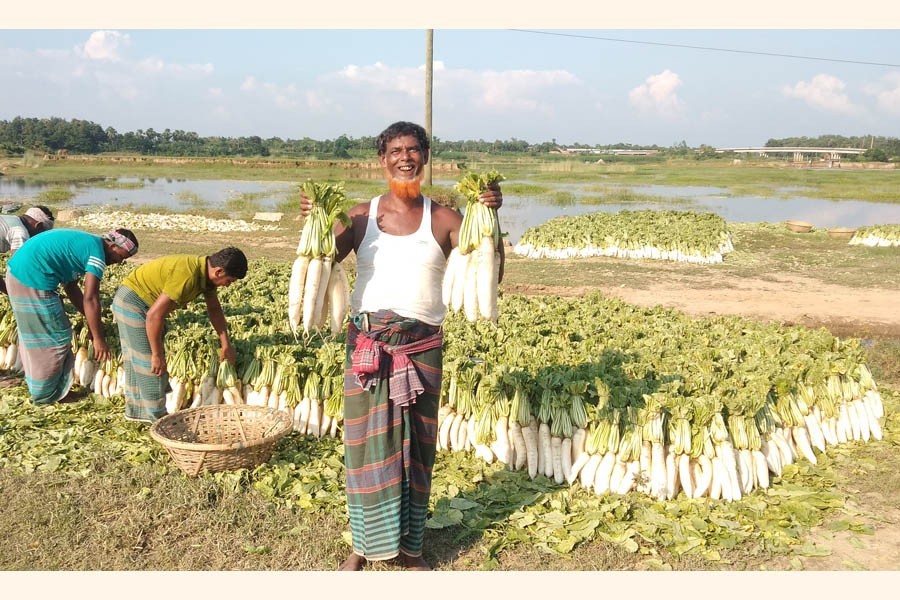Farmers are hopeful of reaping a bumper yield of the early winter variety radish in Cumilla in the upcoming season.
The peasants who commercially produce vegetables cultivated the crop in a large area of the Gumti riverbank long ahead of the winter expecting it to fetch a good profit.
The growers are likely to get the yield of the vegetable even beyond their expectation.
They are now spending busy time tending the crop as the harvesting period is nearing.
Radish was cultivated on a large scale in Subarnapur, Jallupara, Tikkarchar and Shaldhar areas of Sadar upazila of Cumilla.
Besides, the vegetable was cultivated in Alekharchar, Balikhara, Vanti, Bhurburia and Mithilapur areas of Burichang upazila.
These areas fall within the Gumti riverbank. If one goes to visit these areas, vast tracts of land covering radish fields will come into their views.
Farmer Ahmed Ullah said they are going to have a bumper yield of radish due to the favorable climactic condition this year.
A few of the growers have already harvested the vegetable and are selling it at good prices.
Abul Kalam, a farmer of Sholanal village in Burichang upazila, said he cultivated radish on 40 decimals of land on the bank of the Gumti river.
His total production cost amounted to Tk 30,000- that included seeds, fertilisers, pesticides and agricultural wages. Now he has sold radish worth Tk75,000.
Excluding all expenses, in just one month, his profit has been Tk45000, said Abul Kalam, adding that he is very much happy with the yield.
Arafat Mridha, a vegetable trader from Chattogram, said, "I've bought radish from here for Tk70,000. Transportation to Chattogram will cost Tk 10,000 more. And this radish can be sold for Tk 0.12 million (Tk120,000). At present the demand for the vegetable is high in Chattogram."
However, farmer Liaquat Ali said there are two problems in cultivating vegetables including radish on the Gumti riverbank.
He demanded that the authorities extend help to solve these problems immediately.
The first problem is that there exist earthworms in the fields, which destroy saplings. In this case, farmers should apply effective medicine.
The second problem is absence of government support for supply of locally produced vegetables in the market. If supports are given, marginal farmers will be largely benefited. Besides, it will also be possible to increase the country's revenue by exporting vegetables.
Contacted, Surjit Chandra Dutta, deputy director of the Department of Agricultural Extension, Cumilla, said agricultural officials are working at the field level to solve the problems of the above mentioned kinds.
"We are ready to provide any kind of support to the farmers in such problems," he added.


